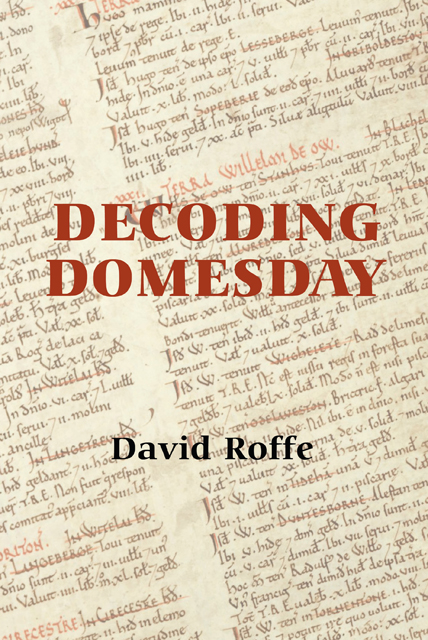Book contents
- Frontmatter
- Contents
- Tables
- Dedication
- Preface
- Acknowledgements
- Abbreviations
- 1 Domesday Past and Present
- 2 The Domesday Texts
- 3 The Inquest and the Book
- 4 The Domesday Boroughs
- 5 Lordship, Land, and Service
- 6 The Vill and Taxation
- 7 The Economy and Society
- 8 The Communities of the Shire
- 9 The Beyond of Domesday
- 10 Domesday Now
- Appendix The main entry forms of GDB
- Bibliography
- Index
4 - The Domesday Boroughs
Published online by Cambridge University Press: 10 March 2023
- Frontmatter
- Contents
- Tables
- Dedication
- Preface
- Acknowledgements
- Abbreviations
- 1 Domesday Past and Present
- 2 The Domesday Texts
- 3 The Inquest and the Book
- 4 The Domesday Boroughs
- 5 Lordship, Land, and Service
- 6 The Vill and Taxation
- 7 The Economy and Society
- 8 The Communities of the Shire
- 9 The Beyond of Domesday
- 10 Domesday Now
- Appendix The main entry forms of GDB
- Bibliography
- Index
Summary
There were 120 or so settlements in Domesday Book that can be categorized as in some sense urban. Fifteen are called cities (civitas), the remainder, either directly or by implication, boroughs (burgus). Civitas translates OE cæster, ‘city, walled town, fortification’, and refers to former Roman settlements. Burgus, representing OE burh, ‘stronghold’, had less specific connotations. There was many a borough, even major ones like Derby, that had never been defended. By the eleventh century burgus had come to mean something like the modern ‘town’, and as such embraced all settlements of the kind, including cities. A vibrant urban economy had long characterized English society. York, Lincoln, Norwich, London, Winchester had been major urban centres of an international stature from at least the early tenth century. Many smaller county boroughs had flourished as local and regional markets from the same period. Archaeological excavations in the last forty years have demonstrated just how diversified was their industrial base and how wide were their trading contacts. The boroughs that the Normans found in 1066 were rich, complex settlements with a long history of urban life.
It is now realized that their origins and patterns of development were various. In the past most thinking about towns had been reductionist. From the nineteenth century attempts were made to define urban status as if it was a legalistic quantity founded in charters of liberties or the like. The work of Ballard, himself a town clerk, epitomizes the approach of historians who were steeped in Victorian notions of rational town government. But not all accounts were so simplistic. Maitland was not immune to the intellectual climate of the time, but his account of boroughs, in Domesday Book and Beyond and his study of Cambridge in Township and Borough, was by far the most nuanced. He recognized that boroughs were settlements that retained rural characteristics; most had fieldsand agriculture was still a significant activity for townsmen in the eleventh century. Nevertheless, he accepted that they had a special status that distinguished them, both legally and functionally, from the surrounding countryside.
- Type
- Chapter
- Information
- Decoding Domesday , pp. 109 - 143Publisher: Boydell & BrewerPrint publication year: 2015



